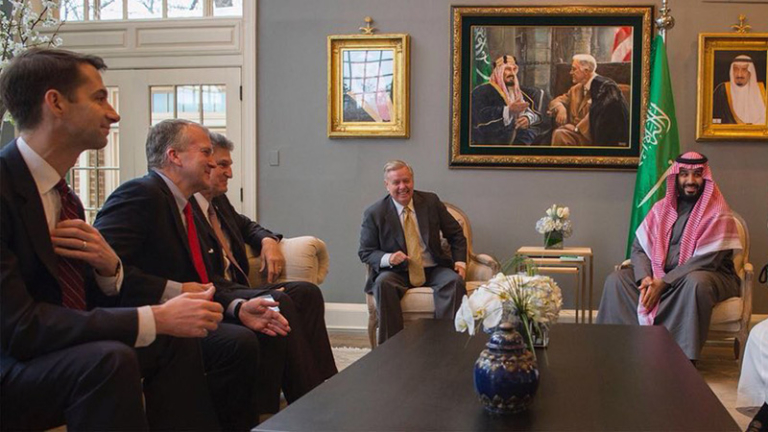
New challenges abound for President Joe Biden in 2023. The loss of a Democratic majority in the House of Representatives for the 118th Congress promises to lead to a scrum of investigations focused on alleged misdeeds by administration officials and members of the president’s family. Possible impeachment efforts directed at cabinet officials, and even at the President himself, might also loom on the horizon.
All of this portends a certain amount of chaos in US politics and policy, foreign policy included. But with regard to the Middle East, little change should be expected, since there is remarkable continuity among the incoming House Republicans and the administration, except perhaps on one issue: policy toward Saudi Arabia.
No Black Swans
The prospective chairs of important House committees related to international affairs appear to represent a continuum with internationalist Republican foreign policies of the past. Michael McCaul (R-Texas), the prospective incoming chair of the House Foreign Affairs Committee, is a former federal prosecutor and a hardliner on China policy, but lacks a notable profile on Middle East issues. Mike Rogers (R-Alabama), who is in line to head the House Armed Services Committee, seems likely to support current defense priorities, including arm sales to the Middle East and North Africa. Neither of these legislators vary in any great degree from current White House foreign policy orthodoxy—nor do many other House Republicans, for that matter. Black swans may still fly, but should not be expected to come from these quarters.
Fear and Loathing in the US Congress, and in the White House
Saudi Arabia may be a standout when it comes to US Middle East policy. At least since the October 2018 murder and dismemberment of US-based journalist Jamal Khashoggi in the Saudi Consulate in Istanbul, there has been some degree of bipartisan consensus in Congress on the need to curb the United States’ indulgence of Saudi human rights abuses, its foreign adventurism in Yemen, and certain policies that seem hostile to US goals in the Middle East and beyond. Repeated attempts at penalizing the kingdom, however, have fallen short, although they have gotten as far as the president’s desk. In 2019, former President Donald Trump vetoed legislation aimed at prohibiting all arms sales to Saudi Arabia, on the grounds that it would injure US global competitiveness.
There has been some degree of bipartisan consensus in Congress on the need to curb the United States’ indulgence of Saudi human rights abuses, its foreign adventurism in Yemen, and its policies that are apparently hostile to US goals in the Middle East and beyond.
President Biden, for his part, promised during his 2020 presidential campaign to make Saudi Arabia a “pariah” for its human rights violations, including the Khashoggi assassination, which the US intelligence community believes was ordered by Saudi Crown Prince Mohammed bin Salman (MBS). Biden nevertheless met with MBS in July, much to the consternation of many in the human rights community. The president did so in an attempt to get the Saudis to agree to boost oil production at a time of heightened supply pressure due to the Russian war in Ukraine.
The meeting was rife with tension. The question of whether Biden would or would not shake hands with the crown prince became headline-worthy news, and the apparent compromise of a fist-bump was dissected and derided in the international media. The meeting itself caused additional US-Saudi tension, since although MBS privately agreed to increase production, he later reneged, engineering an OPEC+ production cutback. Biden reacted with a pledge to re-evaluate the US-Saudi relationship.
This formal review of US-Saudi relations—if it is underway at all—has so far not resulted in any visible changes to the relationship. But what the administration has failed to do, Congress might. Bipartisan sentiment exists to punish Saudi Arabia for its oil politics, as well as its pernicious role in the Yemen war. Despite the defeat of human rights stalwart Representative Tom Malinowski (D-New Jersey), who lost his bid for re-election in a heavily gerrymandered district, certain representatives who wish to see Saudi Arabia reprimanded remain in Congress, including Don Beyer (D-Virginia) and Ro Khanna (D-California). A raft of legislation has been introduced in the current Congress aimed at curbing the influence of Saudi Arabia due to its human rights violations, foreign adventurism, and other actions deemed unhelpful to US foreign policy goals, including its ostensible alliance with Russia in the context of oil supplies and the Ukraine war. The administration’s November decision to recommend that an American court grant MBS diplomatic immunity from US lawsuits related to the Khashoggi killing may add fuel to the fire, especially now that a US federal court has indeed dismissed such a lawsuit against the crown prince.
Senators Bob Menendez (D-New Jersey) and Richard Blumenthal (D-Connecticut) have both spoken out against Saudi Arabia’s apparent alliance with Russia. Blumenthal, along with Representative Khanna, introduced legislation in October aimed at prohibiting arms sales to the kingdom.
A number of US senators have joined or are expected to join the fray. Senators Bob Menendez (D-New Jersey) and Richard Blumenthal (D-Connecticut) have both spoken out against Saudi Arabia’s apparent alliance with Russia. Blumenthal, along with Representative Khanna, introduced legislation in October aimed at prohibiting arms sales to the kingdom. Senator Chris Murphy (D-Connecticut) has been a vocal critic of Saudi Arabia as well, especially on human rights issues, and will be a force on this matter in the next Congress. He, too, called for a freeze on military sales to Riyadh this fall, tying his statement to Saudi Arabia’s unhelpful stance on Ukraine. Murphy argued that hi-tech anti-aircraft and missile-defense systems, including Advanced Medium Range Air-to-Air Missiles (AMRAAM), should be diverted from the kingdom to assist in Ukraine’s own urgent air defenses. With the Senate in Democratic control, Saudi policy could be a troublesome issue for the administration.
Incoming House Republicans may have their own axes to grind as well. Some may be expected to try to use Biden’s Saudi policy failures as a weapon against the administration. In general, however, Republicans appear to be lining up in favor of continuity. Senator Joni Ernst (R-Iowa) recently cautioned the administration against making drastic changes in American security relationships with Middle East countries, specifically criticizing the postponement of a planned US-GCC meeting on integrated air defense. Ernst argued that this would inhibit regional security cooperation aimed at countering threats from Iran. This Iran-centric argument promises to constitute the core of any Republican attack on a Biden administration policy of downgrading bilateral relations with Saudi Arabia.
Change on the Horizon? Maybe Not
Despite political ire aimed at Riyadh, it would be unwise to expect too much in terms of US policy changes. Individual voices in Congress have not yet added up to a legislative moment, and anti-Saudi sentiment, while fierce in some quarters, remains largely inchoate. Moreover, any major congressional move to limit arms sales or to otherwise restrict US relations with the kingdom may well run afoul of local American politics, given how much such sales and their economic benefits are perceived to contribute to the US economy.
The administration itself shows no sign of wanting to make major changes. While Biden appeared to promise a wholesale reevaluation of Saudi policy earlier this year, the review itself does not seem to have gained much traction. The status quo approach to regional policy is very much in charge at the State Department and the National Security Council. There, the traditional foundation of the US-Saudi relationship—regional security, arms sales, and oil—remains sacrosanct, even if, in MBS’s thinking, that relationship might not be so inviolate.
A Major Foreign Policy Dilemma
This situation demands more policy attention. MBS, having weathered various expressions of disapprobation from US policymakers, and especially from President Biden, appears to be charting an obstinate, independent, and contradictory foreign policy course. This approach counts on the US for the kingdom’s fundamental security, while simultaneously disdaining Washington geopolitically. The latest example: MBS is preparing to host a summit for Chinese leader Xi Jinping on December 9, in which numerous agreements on economic and military issues are expected to be signed. The Chinese leader’s visit to Riyadh will also encompass meetings with as many as 14 Arab heads of state. In addition, MBS’s Europe policy leans more toward Russia than the United States. This has been a source of consternation for the White House. Where MBS may ultimately be heading is unknown, but every signal seems to flash against the United States.
The crown prince looks to be playing both ends against the middle. US policymakers must now sort out which American interests are most important with regard to the kingdom: energy, security, or human rights. This difficult dilemma is in part a legacy of past US administrations, which variously attempted to gain Saudi acquiescence to a democratic dialogue with their own citizens (Bush); adopted status quo politics with the Saudis while keeping a certain distance, especially on Iran (Obama); or embraced the plutocracy and autocracy of the Saudi ruling family (Trump). It is no wonder, then, that the kingdom was led to ponder where its best chances lie, and to strike out on a path that appears aimed at charting a twisting middle course between Washington, Beijing, and Moscow.
MBS looks to be playing both ends against the middle. US policymakers must now sort out which American interests are most important with regard to the kingdom: energy, security, or human rights.
The Biden administration does not yet appear to have a proactive strategy to counter Saudi Arabia’s drift toward other potential patrons. This absence, of course, will not go unnoticed in Congress. In fact, it may even sway Republicans in whose districts major arms systems are manufactured. There is potential peril for the Biden administration here. The US may be staring a tectonic shift in its Middle East policy in the face. But the administration must first understand this fact, and then must adjust strategically. Status quo thinking simply will not do.
Featured image credit: Saudi Press Agency

